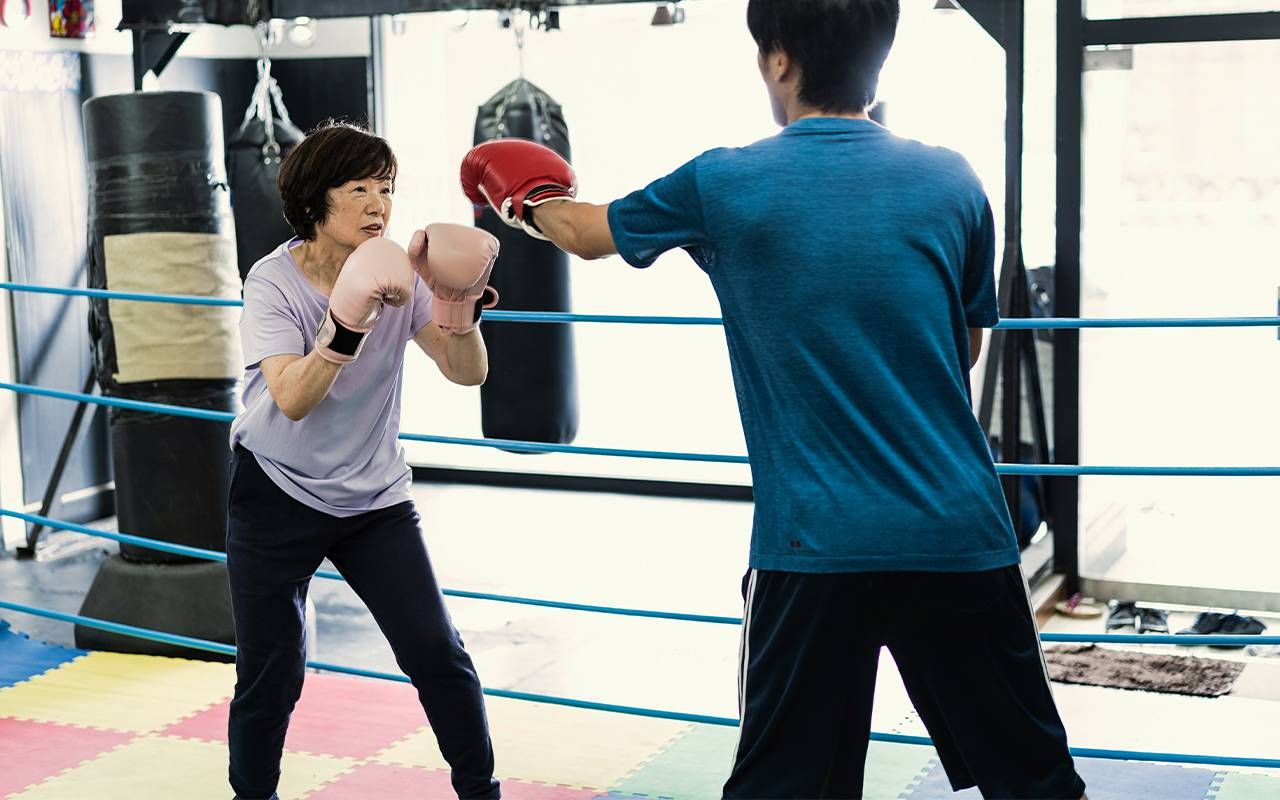Boxing in My 70s Gives Me a Renewed Sense of Power
I have Parkinson's disease. The energy of the boxing room transforms me into someone strong, fierce and relentless.
According to conventional beliefs, I should be degenerating. After all, I'm a 72-year-old grandmother with Parkinson's. But the first word I use to define myself is strong. I exercise daily. I've lost 20 pounds, and I believe I will feel even more powerful next year.

I attribute this radical optimism to a team of three characters in this drama that is my life. First, my supportive husband devours books and articles about anti-aging, giving out encouragement and information freely. Then, there is a functional neurologist I've seen since my diagnosis. He has taught me about neuroplasticity.
In my twice-monthly sessions with the functional neurologist, we work on exercises that strengthen my gait, balance and cognitive functions.
The Functional Neurology Society explains that "research has confirmed that we have the ability to create new neurons (neurogenesis), a process long considered impossible." This is how we learn new skills and how a person who has suffered a stroke of the brain's language centers may still regain the ability to speak.
In my twice-monthly sessions with the functional neurologist, we work on exercises that strengthen my gait, balance and cognitive functions. I'm also learning to protect my nervous system with diet, exercise and stress-reducing behavior (like prioritizing experiences that bring me joy – spending time with my grandchildren and getting outside in nature hiking, walking and kayaking).
A Fighter on Many Fronts
My boxing coach is the third part of my support team and has turned me into a fighter on many fronts. Yes, boxing! If you had told me in my youth that I'd be punching speed bags, water bags and mitts while collecting Social Security checks, I'd have laughed you out of my red Malibu convertible.
But five years ago, fate floated down, took me by the hand, and fitted me with boxing gloves! I had joined a gym to follow my neurologist's prescription to "keep moving." Several research studies support this advice.
A study in January 2022 concluded that "regular overall physical activity levels over time were significantly associated with slower deterioration of postural and gait stability, activities of daily living and processing speed in patients with PD."
Another study reported in February 2022 Neurology on a clinical trial in Parkinson's patients states "aerobic exercise stabilizes disease progression in the corticostriatal sensorimotor network and enhances cognitive performance."
If you had told me in my youth that I'd be punching speed bags while collecting Social Security checks, I'd have laughed you out of my red Malibu convertible.
I became a devoted student in the Fitness Over Fifty class. One day, I was leaving the gym when I noticed a sign: "Neuro-Boxing with Ron." I had heard that people with PD were getting benefits from boxing.
A September 2022 article in Harvard Men's Health Watch reports, "The wide-legged stance used in boxing and the shifting of your center of gravity when you throw a punch are excellent training for improving balance and posture."
Boxing also strengthens arms, shoulders, core and lower body. Furthermore, there is a thinking component in which you must memorize and execute combinations of punches.
Laurie Keating, a physical therapist assistant with Harvard-affiliated Spaulding Rehabilitation Network and a boxing coach, is quoted in the article: "Non-contact boxing fitness has been shown to help many people with Parkinson's improve their balance, hand-eye coordination, mental focus, muscle strength and body rhythm."
I Could Be Fierce
Even with persuasive research, I needed to figure out if boxing was proper for me. As I told Ron when I finally got the nerve to call him, "I'm a peaceful person. I don't know if I can be violent." And yet, for some reason, I agreed to try it.
At first, I did not feel at home in the hand wraps Ron wove through my fingers and the boxing gloves he laced onto my hands. This was serious boxing. Ron had fought in the ring himself. He was a retired NYPD detective and a former Marine.
He had chased suspects through the most challenging projects in the city and dug through the rubble of Ground Zero after 9/11. He may call his sessions "neuro-boxing" for people who want to challenge the brain to jab, punch and hook on command, but he gives the same training to athletes and weightlifters who work with him.
I will have a powerful voice telling me I know how to stand steady and defend myself against whatever punches life throws me.
By my second training session, not only was I having fun, I wanted more than anything to please my coach. He was seeing something in me that I never knew was there. I could be fierce. I could be powerful. I could be relentless. Boxing is more than a sport. It is an attitude.
The walls of the boxing room are covered with bravado quotations by Muhammad Ali and other greats. When my attitude was sub-par, Ron shouted many wise words at me. In one of my first sessions, I responded to an exercise with, "I'll try."
Ron shook his head and quoted Yoda: "Do. Or do not. There is no try." And so, I take it all on, never stopping to ask myself, "who do you think you are calling yourself a boxer?" The words on the wall may have been born in the ring, but they fit all that we deal with in life:
"I don't know how I'm going to win. I just know I'm not going to lose."
"You don't lose if you get knocked down; you lose if you stay down."
"It's not over when you lose. It's over when you quit."
Ron has nicknamed me Tyger. "Tigers are beautiful but fierce," he says, an image I keep in my head when I work out. He spells it "T-y" after Mike Tyson, whose peek-a-boo style I imagine I can replicate. I've learned that I can punch faster than many others who have more power behind their punch.
This means that in a competition with Ron's other fighters (including a professional athlete), I threw more punches (718) in three minutes.
I'll call that: scrappy. That self-definition propels me to scramble up a daunting hiking trail, paddle my kayak against a strong wind, and speak up when I feel dismissed.
On the door of the boxing room is a column of sticky notes. The top one says Tyger 718. This means that in a competition with Ron's other fighters (including a professional athlete), I threw more punches (718) in three minutes. This distinction gives me more pride than my combined SAT scores, college diploma and job promotions.
I can't imagine ever giving up my twice-a-week boxing practice. No matter how tired and draggy I may feel in the morning, I know the pumped-up music and energy of the boxing room will transform me into someone strong and relentless.
Though will I ever develop the bad intentions that a professional boxer cultivates? Maybe not. But hopefully, for the rest of my life, I will have a powerful voice telling me I know how to stand steady and defend myself against whatever punches life throws me.
And if I forget, I'll glance down at the T-shirt Ron gave me that says:
Fate whispers to her, "You cannot withstand the storm."
She whispers, "I am the storm."


